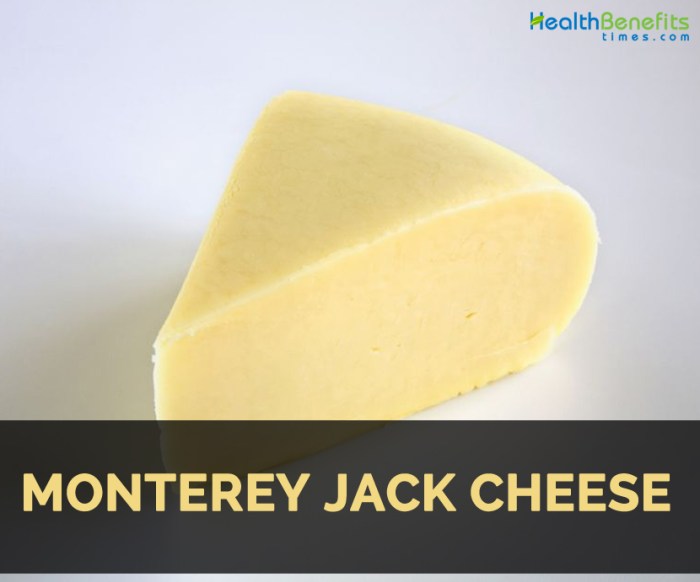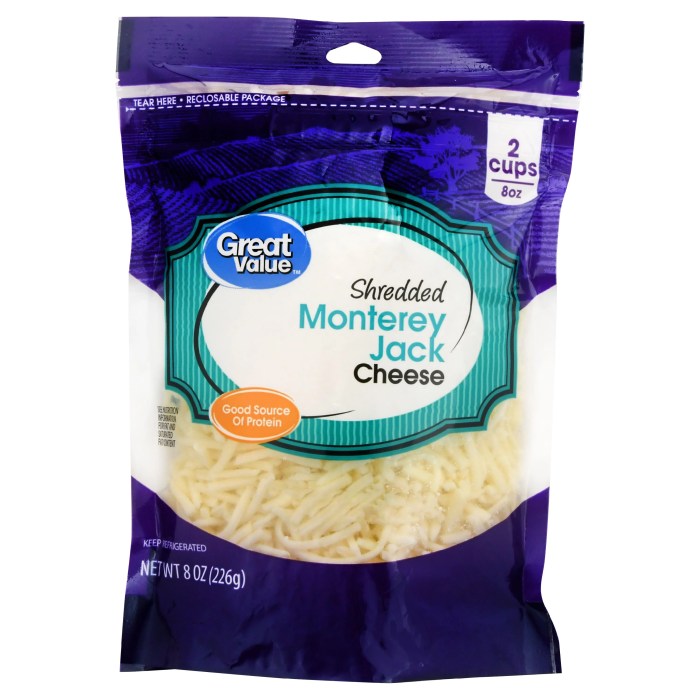Health Implications and Considerations

Monterey jack cheese nutrition – Monterey Jack cheese, like many dairy products, presents a complex picture of nutritional benefits and potential health risks. Its consumption, while offering certain advantages, necessitates careful consideration, especially for individuals with pre-existing health conditions or dietary restrictions. The following analysis will dissect the potential positive and negative health implications associated with Monterey Jack cheese consumption.
Moderate consumption of Monterey Jack cheese can contribute positively to overall health. Its nutritional profile offers a valuable source of calcium, crucial for maintaining strong bones and teeth, and protein, essential for building and repairing tissues. However, the same nutritional profile also harbors potential pitfalls for those who overindulge or have specific health concerns.
Potential Health Benefits of Moderate Consumption
Monterey Jack cheese provides a readily available source of calcium, a vital mineral often deficient in modern diets. Adequate calcium intake is paramount for preventing osteoporosis and maintaining bone density throughout life. Furthermore, the protein content in Monterey Jack contributes to satiety, potentially aiding in weight management when consumed as part of a balanced diet. The cheese also contains various vitamins and minerals, although in smaller quantities compared to calcium and protein.
However, it’s crucial to remember that these benefits are contingent upon
moderate* consumption.
Potential Health Concerns of Excessive Consumption
Excessive consumption of Monterey Jack cheese presents several health risks. The high saturated fat content can contribute to elevated cholesterol levels, increasing the risk of heart disease. Similarly, the significant sodium content can exacerbate high blood pressure in susceptible individuals. Overconsumption of any high-fat, high-sodium food can negatively impact cardiovascular health and contribute to weight gain. The relatively high calorie density also means that even small portions can quickly add up, potentially leading to unwanted weight increase.
Monterey Jack cheese is a milder, slightly sweeter cheese compared to many others. Want to see how it stacks up nutritionally against a sharper option? Check out the detailed cheddar cheese nutrition facts to compare fat, protein, and calcium content. Then you can decide which better fits your dietary needs, and make informed choices about incorporating these cheeses into your meals.
For instance, a single ounce of Monterey Jack can contain over 100 calories, and consuming several ounces daily easily surpasses recommended daily calorie intake for many individuals.
Dietary Recommendations for Specific Health Conditions, Monterey jack cheese nutrition
Individuals with lactose intolerance should consume Monterey Jack cheese with caution, or avoid it altogether. The lactose content, while variable depending on the aging process, can trigger digestive distress. Those with high blood pressure should limit their intake due to the cheese’s high sodium content. Consulting a registered dietitian or healthcare professional is advisable for personalized dietary guidance based on individual health needs and conditions.
For example, individuals with diagnosed hypertension might be advised to substitute lower-sodium alternatives or significantly reduce their overall cheese intake. Similarly, individuals with lactose intolerance may benefit from consuming lactose-free versions of Monterey Jack, if available, or explore alternative calcium and protein sources.
Monterey Jack Cheese and Food Preparation

Monterey Jack cheese, a relatively mild and versatile cheese, finds its place in a surprisingly broad spectrum of culinary applications. Its creamy texture and subtle flavor profile allow it to complement a variety of dishes, from simple snacks to complex entrees. However, the culinary manipulation of this cheese, like any food, necessitates an understanding of how different preparation methods can subtly, yet significantly, alter its nutritional composition.
Ignoring these factors risks undermining the very nutritional benefits one seeks from incorporating Monterey Jack into a healthy diet.The versatility of Monterey Jack cheese is a double-edged sword. While its adaptability allows for creative culinary exploration, the ease with which it can be incorporated into numerous dishes may mask the potential impact of cooking methods on its nutritional profile.
Understanding these impacts is crucial for maximizing the health benefits while enjoying the culinary delights.
Culinary Applications of Monterey Jack Cheese
Monterey Jack’s mild flavor and melting properties make it an exceptionally adaptable ingredient. Its suitability extends beyond simple snacking to more sophisticated dishes, providing both flavor and textural complexity. Overlooking its potential in diverse recipes is a culinary crime.
- Snacks and Appetizers: Cubed and served with fruits, crackers, or vegetables. Think of it as a healthier, more flavorful alternative to processed snack cheeses.
- Sandwiches and Wraps: Its melting capabilities make it ideal for grilled cheese sandwiches, quesadillas, and wraps. The added protein and calcium contribute to a more balanced meal.
- Mexican Cuisine: A staple in dishes like quesadillas, tacos, and enchiladas, providing a creamy, flavorful counterpoint to spicier ingredients.
- Pasta Dishes: Added to pasta sauces, or served alongside pasta dishes, providing a rich, cheesy flavor and added protein.
- Baked Dishes: Incorporated into casseroles, gratins, and other baked dishes, offering a creamy texture and mild flavor that complements other ingredients.
Impact of Cooking Methods on Nutritional Content
The application of heat during cooking alters the chemical composition of Monterey Jack, affecting its nutritional profile, albeit subtly in most cases. While the overall nutritional value remains largely intact, certain vitamins and proteins can be affected by excessive heat or prolonged cooking times. This should be a consideration, particularly for those aiming to maximize the nutritional benefits.
- Baking: Moderate baking temperatures generally preserve the nutritional content. However, prolonged exposure to high heat can lead to some vitamin loss.
- Grilling: Grilling, especially at high temperatures, can cause some fat loss and potentially affect certain vitamins, particularly water-soluble ones. The Maillard reaction, while enhancing flavor, may also slightly alter the nutritional composition.
- Melting: Melting Monterey Jack generally causes minimal nutritional changes. However, adding high-fat ingredients during melting can significantly impact the overall fat content of the final dish.
Recipe: Monterey Jack and Vegetable Quiche
This recipe showcases Monterey Jack’s versatility while prioritizing nutritional value. The quiche offers a balanced combination of protein, calcium, and essential vitamins from the vegetables, offsetting the fat content of the cheese. Ingredients:* 1 pre-made pie crust (whole wheat for added fiber)
- 1 cup chopped broccoli florets
- 1/2 cup chopped bell peppers (any color)
- 1/2 cup chopped mushrooms
- 1/2 cup chopped onions
- 2 large eggs
- 1/2 cup milk (skim or almond for lower fat)
- 1/4 cup grated Monterey Jack cheese
- Salt and pepper to taste
Instructions:
- Preheat oven to 375°F (190°C).
- Sauté vegetables in a pan with a little olive oil until tender-crisp.
- Whisk together eggs and milk. Season with salt and pepper.
- Combine sautéed vegetables and egg mixture in a bowl.
- Pour mixture into the pie crust.
- Sprinkle Monterey Jack cheese evenly over the top.
- Bake for 30-35 minutes, or until the quiche is set and golden brown.
Nutritional Information (per serving, approximate):* Calories: Approximately 250-300
Protein
15-20g
Fat
15-20g
Carbohydrates
15-20g
Calcium
High (due to cheese and vegetables)Note: Nutritional information is an estimate and may vary based on specific ingredients used.
User Queries: Monterey Jack Cheese Nutrition
Is Monterey Jack cheese good for weight loss?
In moderation, Monterey Jack can be part of a weight-loss diet. Choose low-fat varieties and be mindful of portion sizes due to its calorie and fat content.
Can people with lactose intolerance eat Monterey Jack cheese?
Some individuals with lactose intolerance may tolerate small amounts of aged Monterey Jack cheese better than fresh varieties, as aging reduces lactose content. However, reactions vary, so it’s best to proceed cautiously and listen to your body.
How does Monterey Jack cheese compare to cheddar in terms of nutrition?
Both cheeses offer protein and calcium, but cheddar generally has a higher fat and calorie content than Monterey Jack. Nutritional values vary depending on the fat content of each cheese.
Is Monterey Jack cheese a good source of protein?
Yes, Monterey Jack cheese is a decent source of protein, contributing to daily protein needs. However, it’s important to consider the overall protein intake from other sources in your diet.
